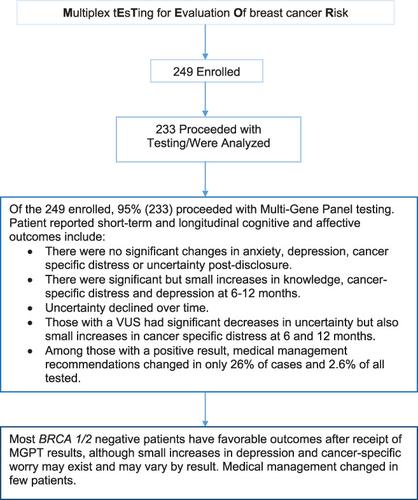当前位置:
X-MOL 学术
›
Clin. Genet.
›
论文详情
Our official English website, www.x-mol.net, welcomes your
feedback! (Note: you will need to create a separate account there.)
Longitudinal outcomes with cancer multigene panel testing in previously tested BRCA1/2 negative patients.
Clinical Genetics ( IF 2.9 ) Pub Date : 2020-03-11 , DOI: 10.1111/cge.13716 Angela R Bradbury 1, 2, 3 , Brian L Egleston 4 , Linda J Patrick-Miller 5 , Neil Rustgi 1 , Amanda Brandt 1 , Jamie Brower 1 , Laura DiGiovanni 1 , Dominique Fetzer 1 , Christopher Berkelbach 1 , Jessica M Long 1 , Jacquelyn Powers 1 , Jill E Stopfer 1 , Susan M Domchek 1, 3
Clinical Genetics ( IF 2.9 ) Pub Date : 2020-03-11 , DOI: 10.1111/cge.13716 Angela R Bradbury 1, 2, 3 , Brian L Egleston 4 , Linda J Patrick-Miller 5 , Neil Rustgi 1 , Amanda Brandt 1 , Jamie Brower 1 , Laura DiGiovanni 1 , Dominique Fetzer 1 , Christopher Berkelbach 1 , Jessica M Long 1 , Jacquelyn Powers 1 , Jill E Stopfer 1 , Susan M Domchek 1, 3
Affiliation

|
Although multigene panel testing (MGPT) is increasingly utilized in clinical practice, there remain limited data on patient-reported outcomes. BRCA 1/2 negative patients were contacted and offered MGPT. Patients completed pre- and post-test counseling, and surveys assessing cognitive, affective and behavioral outcomes at baseline, post-disclosure and 6 and 12 months. Of 317 eligible BRCA1/2 negative patients who discussed the study with research staff, 249 (79%) enrolled. Decliners were more likely to be older, non-white, and recruited by mail or email. Ninety-five percent of enrolled patients proceeded with MGPT. There were no significant changes in anxiety, depression, cancer specific distress or uncertainty post-disclosure. There were significant but small increases in knowledge, cancer-specific distress and depression at 6-12 months. Uncertainty declined over time. Those with a VUS had significant decreases in uncertainty but also small increases in cancer specific distress at 6 and 12 months. Among those with a positive result, medical management recommendations changed in 26% of cases and 2.6% of all tested. Most BRCA1/2 negative patients have favorable psychosocial outcomes after receipt of MGPT results, although small increases in depression and cancer-specific worry may exist and may vary by result. Medical management changed in few patients. This article is protected by copyright. All rights reserved.
中文翻译:

在先前测试的 BRCA1/2 阴性患者中进行癌症多基因组测试的纵向结果。
尽管多基因组检测 (MGPT) 在临床实践中的应用越来越多,但关于患者报告结果的数据仍然有限。联系了 BRCA 1/2 阴性患者并提供了 MGPT。患者在基线、披露后以及 6 个月和 12 个月时完成了测试前和测试后咨询,以及评估认知、情感和行为结果的调查。在与研究人员讨论研究的 317 名符合条件的 BRCA1/2 阴性患者中,有 249 名 (79%) 入组。拒绝者更有可能年龄较大、非白人,并且是通过邮件或电子邮件招募的。95% 的登记患者进行了 MGPT。焦虑、抑郁、癌症特异性痛苦或披露后的不确定性没有显着变化。在 6-12 个月时,知识、癌症特异性痛苦和抑郁症有显着但小幅增加。不确定性随着时间的推移而下降。那些有 VUS 的人在 6 个月和 12 个月时不确定性显着降低,但癌症特异性痛苦也有小幅增加。在结果呈阳性的病例中,26% 的病例和 2.6% 的所有检测病例的医疗管理建议发生了变化。大多数 BRCA1/2 阴性患者在收到 MGPT 结果后都有良好的社会心理结果,尽管可能存在抑郁和癌症特异性担忧的小幅增加,并且可能因结果而异。少数患者的医疗管理发生了变化。本文受版权保护。版权所有。大多数 BRCA1/2 阴性患者在收到 MGPT 结果后都有良好的社会心理结果,尽管可能存在抑郁和癌症特异性担忧的小幅增加,并且可能因结果而异。少数患者的医疗管理发生了变化。本文受版权保护。版权所有。大多数 BRCA1/2 阴性患者在收到 MGPT 结果后都有良好的社会心理结果,尽管可能存在抑郁和癌症特异性担忧的小幅增加,并且可能因结果而异。少数患者的医疗管理发生了变化。本文受版权保护。版权所有。
更新日期:2020-03-26
中文翻译:

在先前测试的 BRCA1/2 阴性患者中进行癌症多基因组测试的纵向结果。
尽管多基因组检测 (MGPT) 在临床实践中的应用越来越多,但关于患者报告结果的数据仍然有限。联系了 BRCA 1/2 阴性患者并提供了 MGPT。患者在基线、披露后以及 6 个月和 12 个月时完成了测试前和测试后咨询,以及评估认知、情感和行为结果的调查。在与研究人员讨论研究的 317 名符合条件的 BRCA1/2 阴性患者中,有 249 名 (79%) 入组。拒绝者更有可能年龄较大、非白人,并且是通过邮件或电子邮件招募的。95% 的登记患者进行了 MGPT。焦虑、抑郁、癌症特异性痛苦或披露后的不确定性没有显着变化。在 6-12 个月时,知识、癌症特异性痛苦和抑郁症有显着但小幅增加。不确定性随着时间的推移而下降。那些有 VUS 的人在 6 个月和 12 个月时不确定性显着降低,但癌症特异性痛苦也有小幅增加。在结果呈阳性的病例中,26% 的病例和 2.6% 的所有检测病例的医疗管理建议发生了变化。大多数 BRCA1/2 阴性患者在收到 MGPT 结果后都有良好的社会心理结果,尽管可能存在抑郁和癌症特异性担忧的小幅增加,并且可能因结果而异。少数患者的医疗管理发生了变化。本文受版权保护。版权所有。大多数 BRCA1/2 阴性患者在收到 MGPT 结果后都有良好的社会心理结果,尽管可能存在抑郁和癌症特异性担忧的小幅增加,并且可能因结果而异。少数患者的医疗管理发生了变化。本文受版权保护。版权所有。大多数 BRCA1/2 阴性患者在收到 MGPT 结果后都有良好的社会心理结果,尽管可能存在抑郁和癌症特异性担忧的小幅增加,并且可能因结果而异。少数患者的医疗管理发生了变化。本文受版权保护。版权所有。











































 京公网安备 11010802027423号
京公网安备 11010802027423号